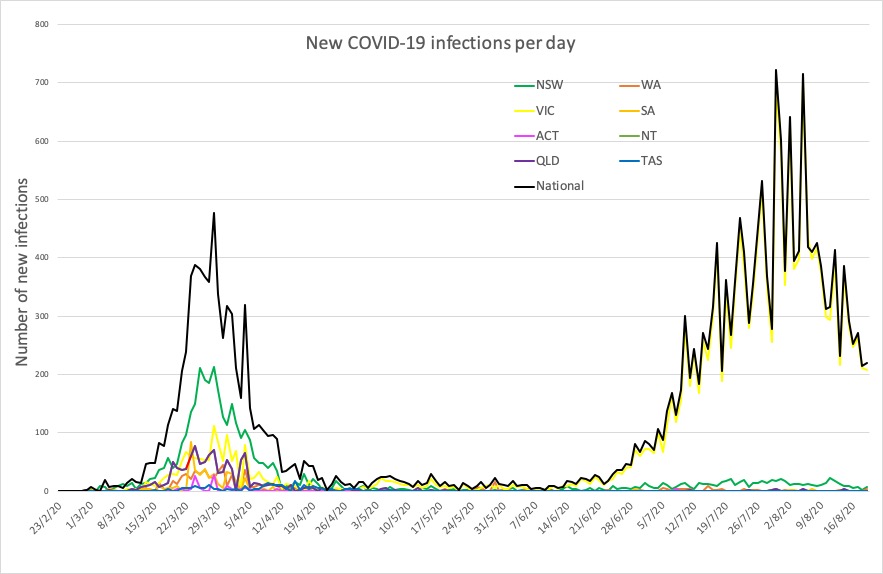Loss of smell during COVID-19 infection may be related to the high proportion of ACE-2 inhibitors in the ‘smell zone’, which researchers suggest may be the virus's main way in.
Welcome to The Medical Republic‘s COVID Catch-Up.
It’s the day’s COVID-19 news into one convenient post. Email bianca@biancanogrady.com with any tips, comments or feedback.
20 August
- The nose has higher concentration of ACE2 protein than rest of respiratory tract, and may be key entry point for SARS-CoV-2.
- Pregnancy and COVID-19 together do not appear to be linked to worse outcomes.
- SARS-CoV-2 mutation associated with milder disease.
- Latest confirmed COVID-19 infection figures around Australia.
- The nose knows: loss of smell during COVID-19 infection may be related to the high proportion of ACE-2 inhibitors in the ‘smell zone’, which researchers suggest may be the key entry point for SARS-CoV-2.
Writing in the European Respiratory Journal, researchers reported the results of a study of the immunohistochemistry of nasal tissue samples taken from the olfactory epithelial and respiratory epithelial zones, as well as the trachea. The samples were stained for the ACE2 protein, because the SARS-CoV-2’s spike protein uses the ACE2 receptor to gain access to human cells.
They found that the olfactory mucosa contained the highest intensity of ACE2 but the protein was barely detectable in respiratory epithelium samples and very low in tracheal epithelium samples.
“The differential expression of ACE2 in the olfactory neuroepithelium and respiratory epithelium may help account for the spectrum of nasal-related symptoms, while also raising the intriguing possibility that COVID-19 may be amenable to novel therapeutic approaches,” they wrote. - COVID-19 infection does not appear to be significantly associated with higher rates of adverse pregnancy outcomes or of more severe SARS-CoV-2 infection, according to a review of 60 studies involving 3830 pregnant women, 1287 of whom were SARS-CoV-2-positive.
The review, published in the Australian & New Zealand Journal of Obstetrics and Gynaecology, found 19 neonates tested positive for SARS-CoV-2, but there were no reports of deaths among SARS-CoV-2-infected neonates. Several studies found an elevated prevalence of preterm birth associated with COVID-19 infection, but the authors noted that those studies with the highest rates tended to be the smallest studies.
“Unlike for SARS, MERS or influenza, pregnancy does not appear to be associated with an elevated risk of serious maternal COVID-19 illness compared with the non-pregnant population,” the authors wrote.
Of the 45 breastmilk samples tested, none were positive for SARS-CoV-2. “Vertical transmission appears possible; however, the occurrence of in utero transmission remains unclear,” the authors wrote.
The six studies that universally tested all pregnant women for SARS-CoV-2 found rates of asymptomatic infection ranged from 43.5%-92%. One study also found that pregnant women had a significantly lower incidence of fever with COVID-19 compared to non-pregnant patients with COVID-19. - Researchers have identified a mutation in SARS-CoV-2 that is associated with milder disease.
A retrospective cohort study, published in The Lancet, involving 131 people with PCR-confirmed SARS-CoV-2 found 22% were infected with the variant, 70% were infected with the wild-type, and 8% had a mix of both forms.
The mutation affects the gene for the ORF8 protein, but it’s not clear what the biological function of that protein is for SARS-CoV-2. However patients with the variant form of SARS-CoV-2 presented to hospital later after the onset of symptoms, had a lower median temperature and showed less systemic inflammation compared to patients with the wild-type virus. They had similar rates of pneumonia but fewer of them needed supplemental oxygen and they had lower odds of developing hypoxia.
“The observed attenuated clinical features further suggest that ORF8 is a possible target for therapeutic intervention and for the development of a SARS-CoV-2 controlled human infection model,” the authors wrote. - Here are the confirmed COVID-19 infection numbers around Australia to 9pm Wednesday:
National – 23,993, with 450 deaths and 694 hospitalised
ACT – 113 (0)
NSW – 3966 (7)
NT – 33 (0)
QLD – 1092 (1)
SA – 462 (0)
TAS – 230 (0)
VIC – 17,446 (216)
WA – 651 (4)



